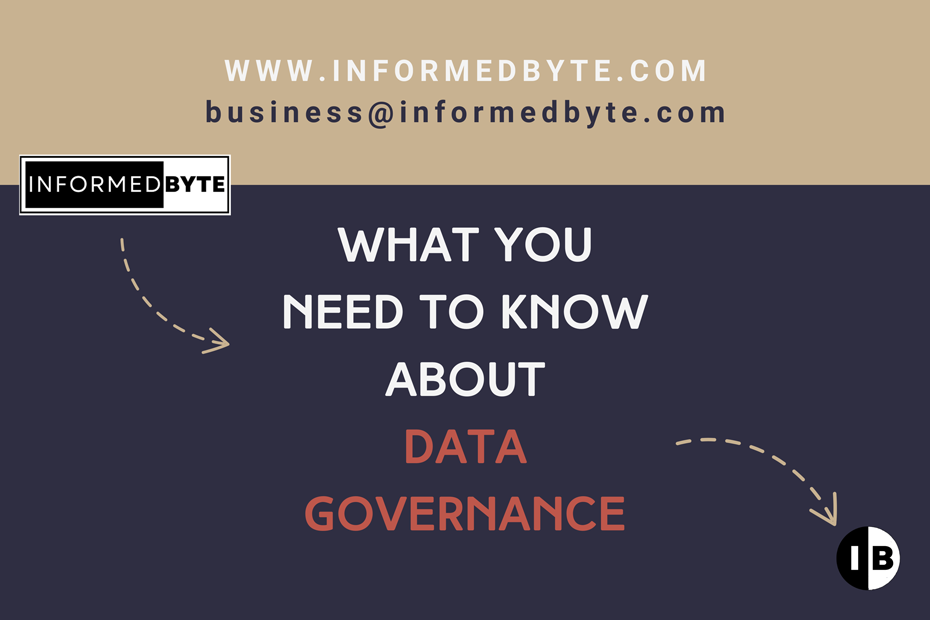What You Need to Know About Data Governance
April 15, 2025
Data governance is a necessary attachment to data and information ownership, ensuring that data is managed effectively, securely, and in compliance with relevant regulations. We explore the key components of data governance, its benefits, and how Informed Byte can assist organisations in implementing effective data governance strategies.

Image credit by Pete Linforth from Pixabay
Understanding Data Governance
Data governance refers to the overall management of the availability, usability, integrity, and security of the data employed in an enterprise. It involves a set of processes, policies, standards, and metrics that ensure the effective and efficient use of information in enabling an organisation to achieve its goals. The primary objectives of data governance include:
Data Quality: Ensuring that data is accurate, consistent, and reliable.
Data Security: Protecting data from unauthorised access and breaches.
Data Compliance: Adhering to relevant laws, regulations, and standards.
Data Management: Establishing clear roles and responsibilities for data stewardship and management.
Key Components of Data Governance
Data Stewardship: Data stewards are responsible for managing data assets, ensuring data quality, and enforcing data governance policies. They play a crucial role in maintaining the integrity and reliability of data.
Data Policies and Standards: Establishing clear policies and standards for data management is essential. These policies define how data should be collected, stored, processed, and used within the organisation.
Data Quality Management: Implementing processes and tools to monitor and improve data quality is vital. This includes data cleansing, validation, and enrichment to ensure that data remains accurate and useful.
Data Security and Privacy: Protecting data from unauthorised access and ensuring compliance with data privacy regulations is a fundamental aspect of data governance. This involves implementing security measures such as encryption, access controls, and regular audits.
Data Compliance: Organisations must comply with various regulations and standards related to data management, such as GDPR, HIPAA, and CCPA. Data governance frameworks help ensure that these requirements are met.
Data Architecture and Integration: Defining the data architecture and ensuring seamless integration of data across different systems and platforms is crucial for effective data governance. This includes data modelling, metadata management, and data lineage tracking.
Benefits of Data Governance
Effective data governance offers numerous benefits to organisations, including:
Improved Decision-Making: High-quality, reliable data enables better decision-making and strategic planning. Organisations can leverage accurate data to gain insights, identify trends, and make informed business decisions.
Enhanced Data Security: Robust data governance frameworks help protect sensitive data from breaches and unauthorised access. This reduces the risk of data loss, financial penalties, and reputational damage.
Regulatory Compliance: Data governance ensures that organisations comply with relevant laws and regulations, avoiding legal issues and fines. It also helps build trust with customers and stakeholders by demonstrating a commitment to data privacy and security.
Operational Efficiency: Streamlined data management processes and standardised data practises improve operational efficiency. This reduces redundancy, minimises errors, and enhances collaboration across departments.
Increased Data Value: By ensuring data quality and consistency, organisations can maximise the value of their data assets. High-quality data can be leveraged for analytics, business intelligence, and innovation.
Challenges in Implementing Data Governance
While the benefits of data governance are clear, implementing an effective data governance framework can be challenging. Some common challenges include:
Cultural Resistance: Employees may resist changes to data management practises, especially if they perceive them as additional work or unnecessary bureaucracy. Overcoming this resistance requires effective communication and change management strategies.
Resource Constraints: Implementing data governance requires investment in technology, tools, and skilled personnel. Organisations with limited resources may struggle to allocate the necessary budget and manpower.
Complex Data Environments: Modern organisations often have complex data environments with multiple systems, platforms, and data sources. Integrating and managing data across these environments can be challenging.
Evolving Regulations: Data privacy and security regulations are constantly evolving. Keeping up with these changes and ensuring ongoing compliance can be difficult for organisations.
How Informed Byte Can Assist
Informed Byte is a leading provider of information management solutions, offering a range of services to help organisations implement effective data governance frameworks.
Consulting and Strategy Development: Informed Byte's experts can work with your organisation to develop a tailored data governance strategy that aligns with your business goals and regulatory requirements. We provide guidance on best practises, policy development, and implementation planning.
Data Quality Management: Providing services for data quality management, including data cleansing, validation, and enrichment. These solutions help ensure that your data remains accurate, consistent, and reliable.
Training and Support: Informed Byte offers training and CPD programs to educate employees on data governance best practises and the importance of data stewardship. We also provide ongoing support to ensure the successful implementation and maintenance of data governance frameworks.
Technology Solutions: Informed Byte are independent and help to find the right technology solutions to support data governance, including data management platforms, metadata management tools, and data integration solutions. These tools help streamline data management processes and improve data quality.

